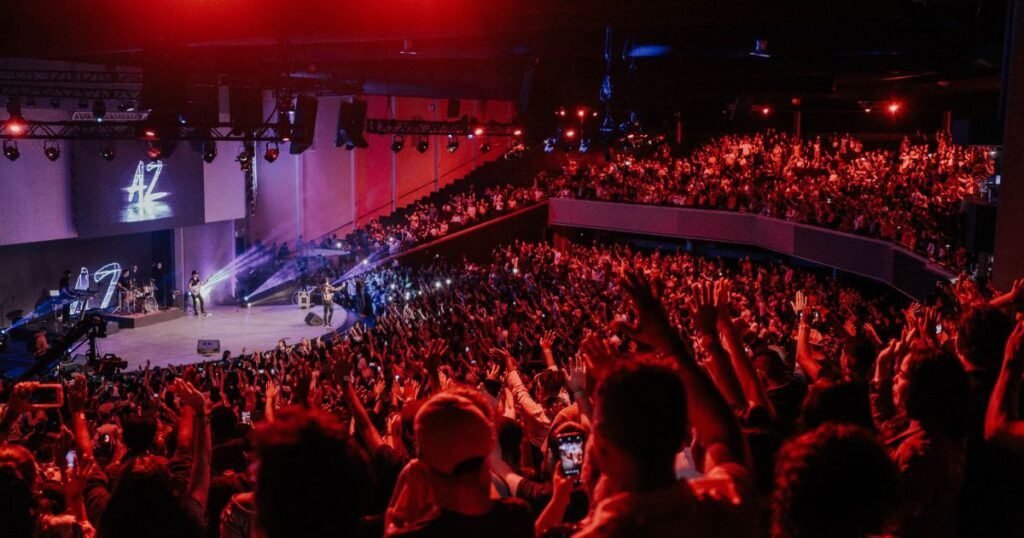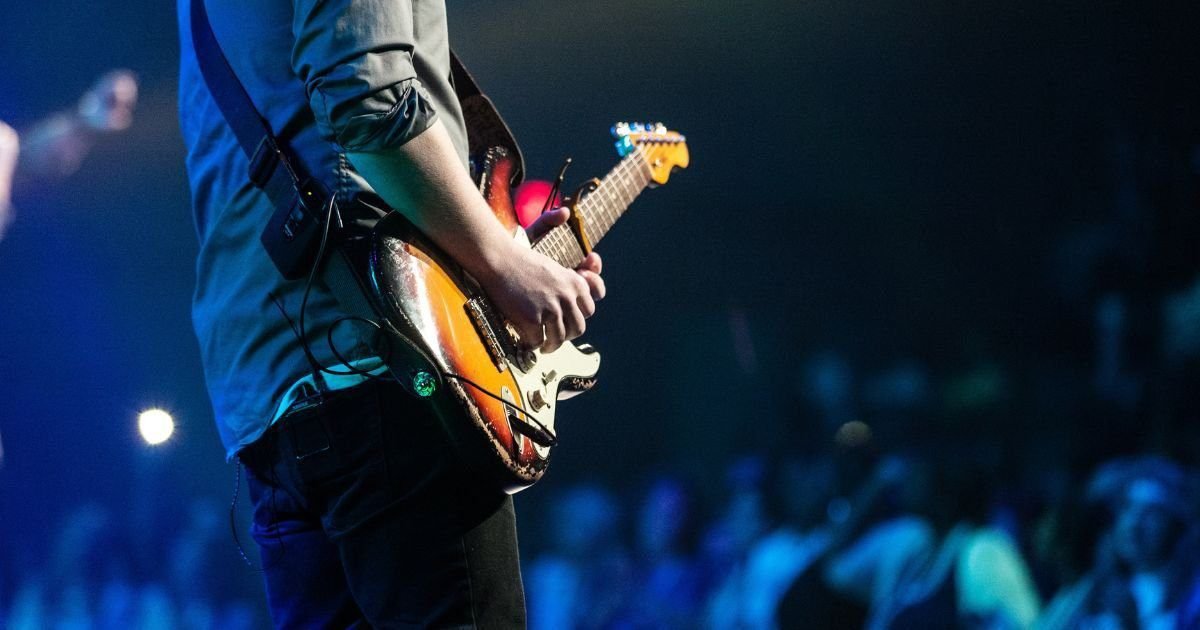Why Host a Concert?
Hosting a concert is a thrilling, rewarding experience, and for many, it’s an opportunity to bring people together in a unique, immersive environment. Whether you’re an event organizer, a brand looking to engage an audience, or an artist wanting to showcase talent, hosting a concert offers numerous advantages. From creating unforgettable memories to generating substantial revenue, concerts are impactful on multiple levels.
Concerts can breathe life into communities, establish strong connections between brands and their audiences, and serve as a launchpad for up-and-coming artists. But pulling off a concert successfully involves a series of calculated steps—from planning the venue and budgeting to promoting the event and managing logistics. This guide will help you navigate each of these steps confidently, ensuring your concert not only succeeds but leaves a lasting impression on everyone involved.
Benefits of Hosting Your Own Concert
- Revenue Generation: Concerts offer a profitable opportunity through ticket sales, merchandise, sponsorships, and food and beverage sales.
- Brand Building: For businesses, concerts provide a unique way to reinforce brand image and engage audiences through memorable experiences.
- Artist Promotion: If you’re an artist or promoting one, concerts provide a chance to showcase talent and build a dedicated fan base.
- Community Engagement: Concerts are powerful tools to bring communities together, encouraging local support and strengthening social bonds.
Ready to dive into the essentials of hosting a concert? Let’s start with the planning phase!
Planning the Concert
To host a concert successfully, you need a solid plan that addresses every detail. Planning is the bedrock of a successful event, ensuring all elements align to meet your goals.
Setting Your Concert Goals
The first step in planning any concert is to establish clear goals. What do you hope to achieve with this event? Are you aiming to promote an artist, generate revenue, or create a community-centered experience? Clearly defined goals will guide your decisions, from choosing the venue to planning the event day schedule.
Common goals include:
- Raising awareness about an artist, cause, or brand.
- Building community connections through a shared experience.
- Monetary gains through ticket sales, sponsorships, or merchandise.
Choosing the Right Venue
The venue you select plays a critical role in the concert’s success. Choosing the right space requires understanding the needs of your audience and aligning the venue’s facilities with your goals.
Consider factors like:
- Capacity: Ensure the venue can comfortably hold the expected audience.
- Accessibility: Is the location easy for people to reach? Are there public transportation options or ample parking?
- Acoustics: High-quality sound is vital for any concert, so choose a venue known for good acoustics.
- Amenities: Look for essential amenities like seating arrangements, bathrooms, and backstage areas for performers.
Picking the Date and Time
Scheduling is everything. To maximize attendance, select a date that avoids major holidays or conflicting events in the area. Researching local event calendars will help you avoid overlapping with other major gatherings, which can pull potential attendees away from your concert.
Timing is also crucial; evening hours often work best for concerts since most people are free after work or school. Weekends generally see higher attendance, but it can vary depending on your audience demographics.
Budgeting and Financial Planning
A well-organized budget is essential to keep your event financially viable. Consider every possible expense, from the artist’s fee and venue rental to marketing costs and on-site services. Make a list of fixed costs (like venue rental) and variable costs (like refreshments or merchandise) to get a clear picture of your total expenditure.
Key budgeting considerations include:
- Logistics costs like equipment rental, transportation, and set-up.
- Artist fees and accommodation if applicable.
- Venue costs including security, insurance, and licenses.
- Marketing expenses for digital and physical promotions.

Key Players in Concert Organization
When you host a concert, building a capable and dedicated team is essential. The success of any event, especially a concert, relies on coordination among multiple key players, each fulfilling distinct roles.
Team Structure and Roles
To ensure smooth execution, start by identifying essential roles within your team. Some critical positions include:
- Event Coordinator: This person oversees the entire event and ensures that each department is on track.
- Marketing Specialist: Responsible for promoting the concert, managing social media, and driving ticket sales.
- Production Manager: Handles technical aspects like sound, lighting, and stage design.
- Logistics Coordinator: Manages vendors, transportation, and set-up, ensuring that everything runs on schedule.
Each team member should have a clear understanding of their responsibilities and report to a central figure—typically the event coordinator—to streamline communication.
Working with Artists and Performers
At the heart of every concert are the artists and performers. Their involvement shapes the overall event atmosphere, so selecting the right talent is crucial. When choosing performers, consider the concert’s genre, target audience, and the artists’ fan base.
After selecting artists, it’s vital to:
- Negotiate contracts that outline performance schedules, fees, and any rider requests (special requirements like refreshments or specific equipment).
- Establish open communication so performers feel supported, which ultimately contributes to a high-energy performance.
- Plan rehearsals to ensure sound quality and stage arrangements are set to the artists’ preferences.
Engaging Vendors and Suppliers
Vendors and suppliers are fundamental to an organized concert. From sound and lighting providers to food and merchandise vendors, each brings an essential element to the event experience.
To maintain quality, consider:
- Building relationships with trusted local suppliers who are familiar with concert setups.
- Creating clear contracts detailing responsibilities, timelines, and any contingency plans.
- Regularly checking in to ensure they are prepared for the concert day.
Vendors and suppliers should align with your concert’s goals and contribute positively to the attendee experience.
Concert Promotion
Promotion is a powerful tool when you host a concert. A well-planned marketing campaign drives ticket sales, builds anticipation, and helps spread the word effectively.
Building a Marketing Plan
Your marketing plan should be as detailed as possible, addressing everything from digital advertising to partnerships. Key components include:
- Defining your target audience: Knowing your audience’s preferences helps tailor your promotional content.
- Setting a marketing budget: Allocate funds strategically across social media ads, email marketing, and local promotions.
- Creating a timeline: Plan your marketing activities from the concert announcement to the event day.
A cohesive plan will allow you to build excitement in a structured way, ensuring you reach maximum engagement before the concert.
Social Media Strategies for Concerts
In today’s digital landscape, social media is a primary platform for concert promotion. Use channels like Facebook, Instagram, and Twitter to engage directly with potential attendees.
Some effective tactics include:
- Regular posts featuring behind-the-scenes content, artist announcements, and countdowns.
- Sponsored ads targeting specific demographics to increase visibility.
- Collaborations with influencers or artists to amplify your reach.
Social media allows for real-time engagement, creating a sense of community around your event.
Utilizing Press and Local Media
To broaden your reach beyond social media, consider working with press and local media outlets. Local newspapers, radio stations, and online news sites often have loyal followers who trust their recommendations.
Tips for effective media outreach:
- Send out press releases highlighting unique aspects of your concert.
- Offer exclusive interviews with artists or the organizing team.
- Invite media to attend in exchange for coverage, increasing visibility before and after the event.
Creating Engaging Content for Your Audience
Visual and written content should engage and excite your audience. Consider creating:
- Event posters that visually capture the concert vibe and include essential details.
- Video teasers or short clips of previous concerts or artist performances.
- Interactive content like polls or Q&A sessions with performers to increase anticipation.
By investing in quality content, you create a lasting impression and encourage attendees to purchase tickets.
Ticketing and Sales Strategy
A solid ticketing strategy is essential when you host a concert. Efficient ticketing not only drives sales but also contributes to a smooth event experience for attendees
Choosing Ticketing Platforms
Choosing the right ticketing platform is key to a seamless experience. Some platforms offer additional features like seat selection, QR code tickets, and event reminders.
Popular options include:
- Eventbrite: Known for user-friendly interfaces and extensive reach.
- Ticketmaster: Ideal for large-scale events, offering extensive security features.
- Brown Paper Tickets: Known for affordability and flexibility.
Ensure your ticketing platform aligns with your concert’s scale and audience.
Setting Ticket Prices
Pricing can greatly influence ticket sales. Consider factors like artist popularity, venue location, and audience demographics when setting prices.
Pricing strategies may include:
- Early bird discounts: Encourage early purchases by offering a limited-time discount.
- Tiered pricing: Offer multiple ticket types, such as VIP, general admission, and student discounts.
- Bundle packages: Pair tickets with merchandise or refreshments for added value.
Running Promotions and Offers
Offering promotional deals can boost ticket sales significantly. Consider collaborations with local businesses, radio stations, or online influencers to promote your event.
Promotions could include:
- Social media giveaways to reach a wider audience.
- Group discounts to encourage group attendance.
- Flash sales that create urgency, encouraging potential attendees to buy quickly.
Maximizing Sales Channels
Utilize multiple channels to sell tickets, including:
- Official website for direct sales and concert information.
- Social media integrations to facilitate ticket purchases directly from social posts.
- Local outlets or on-site sales to reach an offline audience.
Using a mix of online and offline channels will ensure you reach a diverse audience, maximizing ticket sales.
Logistics and Event Setup
To host a concert that leaves a lasting impression, logistics and event setup are crucial. Ensuring a smooth and enjoyable experience for both performers and attendees requires careful planning, from sound quality to audience comfort.
Sound and Lighting Requirements
Sound and lighting are at the heart of any concert. High-quality audio and visually engaging lighting elevate the entire experience, creating an immersive atmosphere that draws the crowd in.
Sound System:
- Choose the right audio equipment: High-quality speakers, microphones, and mixers tailored to your venue size will ensure clear sound. Work with a professional sound technician who understands concert acoustics to minimize issues.
- Test acoustics: Each venue has unique acoustics that can affect sound quality. Conduct a sound test before the concert to adjust equipment settings and prevent feedback or echoes.
- Consider artist preferences: Coordinate with performers about their sound requirements, including any specific audio effects or equipment they prefer.
Lighting Setup:
- Design lighting to match the concert vibe: Lighting helps set the mood, whether you’re going for a high-energy rock show or a mellow acoustic night. Invest in programmable lighting to create dynamic effects that match the music’s rhythm.
- Plan lighting cues: Work with a lighting technician to establish cues that align with the performers’ setlist. This will add visual rhythm and enhance the overall performance.
- Include special effects sparingly: Smoke machines, strobe lights, or projections can add excitement when used thoughtfully. Be cautious, as too many effects can overwhelm the audience.
Stage Setup and Audience Experience
A well-planned stage layout is essential for both performers and attendees. An organized, engaging stage setup enhances visibility, comfort, and audience interaction.
- Stage height and positioning: Ensure the stage is elevated enough to offer clear views from all audience areas. The distance between the stage and the audience should allow engagement without being too close for comfort.
- Audience seating and standing areas: Depending on the concert type, plan designated seating or standing zones. For a comfortable experience, provide barriers where needed and consider accessibility for those with disabilities.
- Artist green rooms and backstage areas: Designate secure areas where performers can relax before and after their sets. Ensure the green room has amenities like refreshments, seating, and privacy.
Security and Crowd Management
Safety is paramount when you host a concert. Crowd management ensures attendees have a positive experience without compromising safety.
- Hire professional security: Engage security personnel trained in event management. They should monitor entry points, secure restricted areas, and handle any disturbances calmly.
- Create clear entry and exit paths: Mark pathways with clear signage, and ensure exit routes are unobstructed in case of emergencies.
- Prepare for emergencies: Have a detailed emergency response plan, including first-aid stations and procedures for medical issues. Communicate safety protocols to staff so they can act quickly if needed.
Backup Plans for Emergencies
No event is complete without a contingency plan. Factors like weather, power outages, or equipment failures can disrupt your concert, so preparing backup solutions is crucial.
- Weather considerations: For outdoor events, have a rain plan, including tents, covered stages, or a backup indoor location. Inform ticket holders about the policy in case of postponements due to weather.
- Equipment backup: Keep spare sound equipment like microphones, cables, and amplifiers on hand to minimize delays if something malfunctions.
- Power supply: Consider renting a generator for essential systems in case of a power outage. It’s also wise to have technicians on standby who can troubleshoot issues on-site.
Concert Day Essentials
The day of the concert is when all your planning comes to life. Coordinating tasks efficiently and keeping the team prepared for any last-minute changes will ensure that you host a concert successfully.
Preparing the Venue and Final Checks
Before attendees arrive, your venue should be ready to deliver a flawless experience. Conduct final checks and walkthroughs to confirm everything is in place.
- Test all equipment: Perform final sound and lighting checks to address any last-minute issues. Walk the stage and check visibility, acoustics, and lighting from the audience’s perspective.
- Set up signage and wayfinding: Clear, visible signs help direct attendees to ticket counters, restrooms, seating, and exits. This keeps the crowd moving efficiently.
- Check emergency stations: Ensure medical stations, fire extinguishers, and exits are accessible and fully staffed.
Coordinating with Staff and Volunteers
A successful concert relies on a well-coordinated team. Staff and volunteers are essential to keeping things running smoothly and providing assistance to attendees.
- Brief the team on responsibilities: Hold a pre-concert meeting to review roles, schedules, and any last-minute changes. Everyone should know their tasks and understand the event flow.
- Create a communication plan: Equip staff with radios or phones for quick communication across the venue. Establish contact points for common needs, like lost and found, guest assistance, or security.
- Train volunteers on customer service: Volunteers often interact with attendees, so ensure they’re prepared to answer common questions and provide a welcoming experience.
Managing Timelines and Performances
Time management is crucial to maintaining momentum throughout the event. Each performance should begin and end on schedule to avoid frustrating delays.
- Stick to a strict schedule: Ensure artists and speakers understand the importance of staying on time. Display clocks backstage and have a stage manager cue performers.
- Schedule short breaks between sets: Give the audience brief intermissions, especially for long concerts, to grab refreshments or use restrooms. This keeps them energized and engaged.
- Keep performers informed: Let artists know when they’re expected to go on stage. Maintain open lines of communication to keep everyone updated.
Troubleshooting Common Issues
Every event comes with potential hiccups, so prepare to troubleshoot quickly and keep the concert running smoothly.
- Technical difficulties: If there’s a sound or lighting issue, have backup technicians on hand to resolve it immediately. Communicate with the audience if there’s a brief delay to manage expectations.
- Weather changes (for outdoor concerts): Stay updated on weather conditions and have tarps or coverings ready in case of rain. Communicate any weather-related changes to attendees through social media or signage.
- Unexpected delays: If an artist is delayed or equipment malfunctions, prepare to entertain the crowd with music, videos, or announcements to keep the energy up.
Post-Concert Follow-Up
After you host a concert, the work doesn’t end. A strong follow-up is essential for building lasting relationships, gathering insights, and setting the stage for future events. This phase is just as important as the planning and execution, as it allows you to reflect on what worked well and identify areas for improvement.
Gathering Audience Feedback
Audience feedback provides invaluable insights into their experience, helping you fine-tune your approach for future events. By collecting honest opinions, you’ll learn about strengths and areas that might need improvement.
- Send post-event surveys: Use email or social media to distribute surveys. Keep them short, asking attendees to rate aspects like sound quality, venue comfort, and overall enjoyment.
- Offer incentives: To increase survey responses, offer small incentives like a chance to win free merchandise or tickets to future events.
- Monitor social media feedback: Attendees often share their thoughts on platforms like Twitter and Instagram. Track event hashtags to find posts and comments, responding to feedback where possible.
Assessing Financials and Sales Data
Once the concert is over, a thorough financial review is essential to understand the event’s profitability and ensure all expenses and income are accounted for.
- Compile all income and expenses: Compare actual spending with your initial budget. Include revenue from ticket sales, merchandise, sponsorships, and other streams.
- Calculate profit margins: After subtracting expenses from total revenue, determine the overall profitability. This data is helpful when planning future events and setting realistic financial goals.
- Review ticketing data: Analyze ticket sales data to identify peak purchasing times, popular price points, and demographics. This information will help you optimize sales strategies for future concerts.
Thanking Attendees and Building Connections
Building a loyal audience is key to long-term success. By showing appreciation and staying engaged, you encourage attendees to return for future concerts.
- Send personalized thank-you messages: Use email or social media to thank attendees for their support and participation.
- Share event highlights: Post concert photos, videos, and attendee shoutouts on social media. This keeps the excitement alive and allows attendees to relive memorable moments.
- Invite attendees to follow your channels: Encourage them to follow your social media pages or join your email list to stay updated on upcoming events.
Leveraging Success Stories for Future Events
Success stories and testimonials from the concert serve as social proof, helping you build credibility for future events.
- Gather testimonials from attendees and artists: Positive quotes from attendees, performers, and vendors add credibility. Use these in future promotional materials.
- Document key metrics: Share impressive figures like attendance numbers, engagement rates, and social media mentions. This data shows potential sponsors and partners the impact your concerts have.
- Create a post-event report: Summarize key takeaways, challenges, and achievements in a report. This helps you build a knowledge base for future concert planning and showcases your event expertise to stakeholders.
FAQs on Hosting a Concert
Below are 15 frequently asked questions that will address common concerns for anyone planning to host a concert:
- How much does it cost to host a concert? The cost can vary widely depending on venue, artist fees, production requirements, and promotional expenses. Small concerts might cost a few thousand dollars, while larger events can cost significantly more.
- How do I choose the right venue for my concert? Consider factors like audience size, accessibility, acoustics, and available amenities. The venue should align with the concert’s scale and the comfort of attendees.
- What licenses or permits are required to host a concert? Licensing requirements vary by location, but you may need permits for music, alcohol sales, security, and noise levels. Contact local authorities to determine what’s needed.
- How far in advance should I start planning a concert? Ideally, planning should begin at least three to six months in advance to secure the venue, book artists, and execute a marketing strategy.
- What type of marketing works best for concert promotion? Social media, influencer collaborations, and email marketing are effective. Consider press releases and local media coverage for broader reach.
- How do I set ticket prices for a concert? Base prices on artist popularity, event costs, and audience demographics. Consider offering tiered pricing, including VIP options and early bird discounts.
- Should I hire a professional event planner to help? For large-scale concerts, hiring an event planner or production team can simplify logistics and ensure a professional experience for attendees.
- How can I ensure good sound quality during the concert? Work with experienced sound technicians, conduct pre-event sound checks, and choose equipment that matches the venue’s acoustics.
- What are common safety concerns when hosting a concert? Security, crowd management, and emergency response are crucial. Have a clear safety plan, hire professional security, and establish emergency exits.
- How can I engage attendees after the concert? Send thank-you messages, share event highlights on social media, and encourage attendees to join your email list for updates on future events.
- How do I attract sponsors for my concert? Highlight the concert’s potential reach and audience engagement. Offer sponsorship packages that include branding, signage, and promotional opportunities.
- What’s the best way to manage ticketing for a concert? Use an online ticketing platform with features like QR codes and seat selection. Offer a variety of ticket types and maximize sales through multiple channels.
- How do I manage timing and schedules on the concert day? Create a detailed timeline, assign roles to staff members, and have a stage manager keep everything on schedule to avoid delays.
- How do I handle unexpected challenges during the concert? Prepare backup plans for common issues like equipment malfunctions or artist delays. Have extra staff or technicians on-site to manage troubleshooting.
- What follow-up steps are important after a concert? Gather feedback, review financials, and share event highlights. Thank attendees and performers, and analyze what worked well to improve future events.






